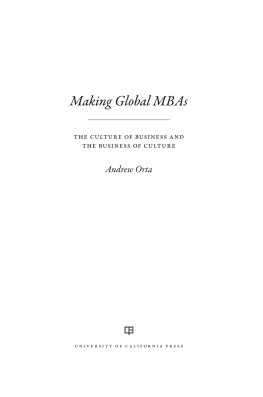
Global Problems and the Culture of Capitalism
Global Problems and the Culture of Capitalism
Sixth Edition
Richard H. Robbins
State University of New York at Plattsburgh

BostonColumbusIndianapolisNew YorkSan FranciscoUpper Saddle River AmsterdamCape TownDubaiLondonMadridMilanMunichParisMontralToronto DelhiMexico CitySo PauloSydneyHong KongSeoulSingaporeTaipeiTokyo
Editor in Chief: Ashley Dodge
Publisher: Nancy Roberts
Editorial Assistant: Molly White
Director of Marketing: Brandy Dawson
Executive Marketing Manager: Kelly May
Marketing Coordinator: Jessica Warren
Managing Editor: Denise Forlow
Program Manager: Mayda Bosco
Production Project Manager: Liz Napolitano
Manager, Central Design: Jayne Conte
Cover Designer: Bruce Kenselaar
Cover Montage Images: top left: David Norton Photography/Alamy; top center: Jules Glazier/Alamy; top right: David W. Hamilton/Alamy; center left: dbimages/Alamy; center right: tony french/Alamy
Director, Digital Media: Brian Hyland
Digital Media Project Manager: Tina Gagliostro
Full-Service Project Management: Shiny Rajesh/Integra Software Services Pvt. Ltd
Printer/Binder: Edwards Brothers / MalloyJackson Road
Cover Printer: Lehigh / Phoenix Color
Text Font: 10/12, Times
Credits and acknowledgments borrowed from other sources and reproduced, with permission, in this textbook appear on appropriate page within text.
Copyright 2014, 2011, 2008 Pearson Education, Inc., publishing as Prentice Hall, 1 Lake St., Upper Saddle River, NJ 07458. All rights reserved. Manufactured in the United States of America. This publication is protected by Copyright, and permission should be obtained from the publisher prior to any prohibited reproduction, storage in a retrieval system, or transmission in any form or by any means, electronic, mechanical, photocopying, recording, or likewise. To obtain permission(s) to use material from this work, please submit a written request to Pearson Education, Inc., Permissions Department, 1 Lake St., Upper Saddle River, NJ 07458.
Many of the designations by manufacturers and seller to distinguish their products are claimed as trademarks. Where those designations appear in this book, and the publisher was aware of a trademark claim, the designations have been printed in initial caps or all caps.
Library of Congress Cataloging-in-Publication Data
Robbins, Richard H. (Richard Howard)
Global problems and the culture of capitalism / Richard H. Robbins.6th ed.
p.cm.
ISBN-13: 978-0-205-91765-5 (alk. paper)
ISBN-10: 0-205-91765-8 (alk. paper)
1.Economic history19902.Social problems.3.Capitalism.4.Consumption (Economics) 5.Poverty.6.Financial crises.I.Title.
HC59.15.R63 2014
330.12'2dc22
2010010395
10987654321

ISBN 10:0-205-91765-8
ISBN 13: 978-0-205-91765-5
Brief Contents
Contents
Preface
Over the past 400 to 600 years, a culture and society, originating for the most part in Europe and dedicated to the idea of trade and consumption as the ultimate source of well-being, began to expand to all parts of the globe. In many ways it is the most successful culture and society the world has ever seen, and its technology, wealth, and power stand as monuments to its success; however, accompanying its expansion have been problemsgrowing social and economic inequality, environmental destruction, mass starvation, and social unrest. Most members of this society and culture perceive these problems as distant from themselves or as challenges for them to meet. However, there is the possibility that these problems, which threaten to negate everything this culture has accomplished, are intrinsic to the culture itself. That is the possibility to be explored in this book.
The outline of this book emerged when, a few years ago, my colleagues at the State University of New York at Plattsburgh, James Armstrong and Mark Cohen, and I began developing a course on global problems. We wanted to create a course that would help students understand the major global issues that they confront in the mass mediaproblems such as the so-called population explosion, famine and hunger, global environmental destruction, the emergence and spread of new diseases, so-called ethnic conflict and genocides, terrorism, and social protest. We learned quickly that to make the course successful, we had to overcome the often-ethnocentric perspectives of the students, perspectives that were often reinforced by media coverage of global affairs. We needed also to compensate for the students lack of backgrounds in anthropology, history, and economics, all crucial for understanding the roots of the problems we were to examine. Finally, we needed to illustrate that the problems we examined were relevant to them, that the problems would affect them either directly or indirectly, and that their actions now or in the future would determine the extent to which the origins of these problems could be acknowledged, let alone ever addressed. The form of this book emerged from our efforts at dealing with these pedagogical issues and the classroom interactions that these efforts stimulated.
The Focus of This Book
We can summarize our approach in this book as follows: There has emerged over the past five to six centuries a distinctive culture or way of life dominated by a belief in trade and commodity consumption as the source of well-being. This culture flowered in Western Europe, reached fruition in the United States, and spread to much of the rest of the world, creating what some anthropologists, sociologists, and historians call the world system. People disagree on the critical factors in the development of this system and even whether it was unique historically, although most agree on certain basic ideas. Among the most important are the assumptions that the driving force behind the spread of the contemporary world system was industrial and corporate capitalism, and that the spread of the world system is related in some way to the resulting division of the world into wealthy nations and poor nations or into wealthy core, developed, or industrialized areas and dependent peripheral, undeveloped, or nonindustrialized areas.
The spread of the capitalist world system has been accompanied by the creation of distinctive patterns of social relations, ways of viewing the world, methods of food production, distinctive diets, patterns of health and disease, relationships to the environment, and so on. However, the spread of this culture has not gone uncontested; there has been resistance in the form of direct and indirect actionspolitical, religious, and social protest and revolution. How and why capitalist culture developed and the reasons why some groups resisted and continue to resist its development are among the questions posed in this book.
The answers to these questions are based on specific assumptions. First, a central tenet of anthropology is that personal, social, cultural, and historical factors determine the point of view any person might have regarding a certain phenomenon. No less is true of those participating in the culture of capitalism who have created a view of global events that we share. Consequently, these views tend to be, to one extent or another, ethnocentric; that is, they describe, evaluate, and judge events solely from a specific cultural perspective. Among the major purposes of anthropology is to teach ways to avoid ethnocentrism and appreciate the importance of understanding the beliefs and behaviors of others from their perspectives rather than from our own, a view anthropologists refer to as cultural relativism . To some extent ethnocentrism is unavoidable, and the job of the person who interprets global eventswhether a journalist, economist, sociologist, or anthropologistis to make the event comprehensible to those people for whom that person is writing. Our assumption is that to minimize cultural bias we must recognize that our views of events are partially influenced by our culture and, for that reason, we must make our own culture an object of analysis.
Next page
















